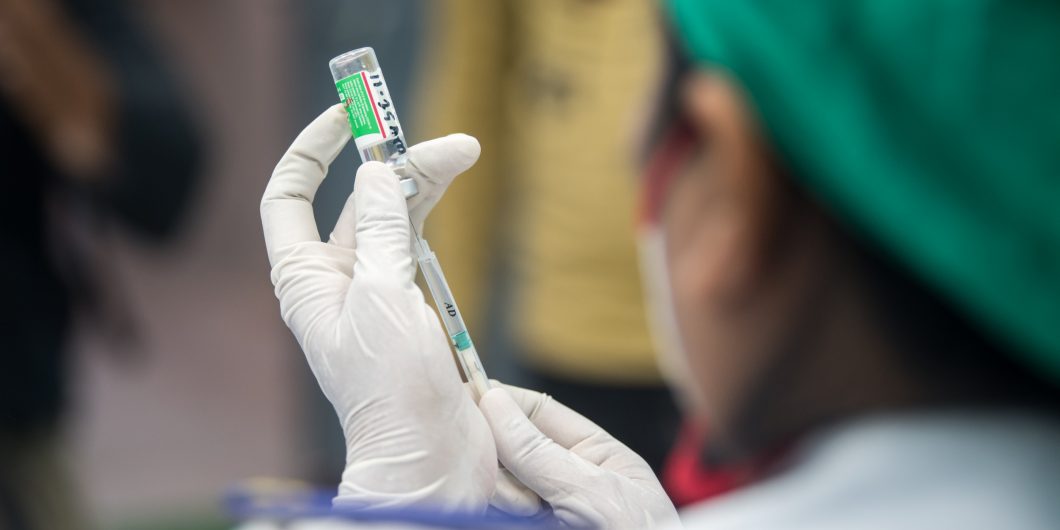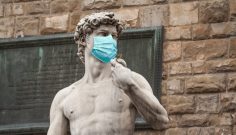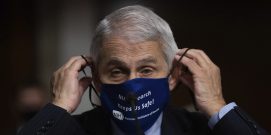The present deformation of rights was not fated from the beginning, as some prominent conservatives have claimed.
Covid-19 and Intellectual Property Rights
In 2020, India and South Africa applied for exemptions from the main international treaty protecting intellectual property (IP) rights—”TRIPS,” short for “Trade-Related Aspects of Intellectual Property Rights.” India and South Africa are asking to be relieved from following TRIPS to the extent that it stops them from withholding or disregarding IP rights for vaccines and therapies against COVID-19. In May, the Biden administration announced that it is supporting India and South Africa’s application.
India and South Africa are applying for an unfair exception to TRIPS, and the Biden administration is making a mistake by supporting their application. The application raises basic questions—about why IP is worth protecting, and how IP rights should be protected across nations with different needs and opinions about IP. Since this website is dedicated to law and liberty, I’ll discuss the policy issues in terms of how they affect property rights.
The “Waiver”
Since COVID-19 spread worldwide, many pioneer pharmaceutical companies—among others, Johnson & Johnson, Moderna, Novavax, and Pfizer—have developed vaccines and other therapies. These vaccines and therapies are protected by many different forms of IP—especially patents, copyrights, industrial designs, and trade secrets.
But IP rights are controversial in international health policy debates. Developing countries often complain that their nationals cannot get adequate access to therapies covered by legal IP rights—meaning in particular rights to IP as strong as the laws in force in most developed countries. Developing countries started voicing this concern as soon as vaccines and therapies were discovered for COVID-19. In October 2020, South Africa and India applied to the World Trade Organization (WTO) for what they called a “waiver” from TRIPS. South Africa and India want to use COVID-19 vaccines and therapies without recognizing IP in them, but they do not want to run afoul of their obligations under TRIPS.
India and South Africa’s application was radical, and one can’t understand how radical it was without understanding how IP is usually treated in international law. Assume that some pioneer company discovers a new pharmaceutical drug and is entitled to IP under the law of its home country. The protection the company gets in its home country doesn’t protect its discovery in any other country. Countries are entitled to their sovereignty; every country should be free to draw IP rights as its nationals see fit. But sovereignty can be abused; countries can set weak protections for IP and let their nationals copy valuable works discovered elsewhere.
These problems are addressed in international treaties, especially TRIPS. TRIPS establishes substantive floors for the main forms of IP. Each of the main parts of TRIPS—on patents, trade secrets, and so on—requires signatory countries to establish in their own IP laws protections consistent with general principles in that field. TRIPS also establishes a nondiscrimination requirement; whatever IP rights a signatory provides for its own nationals must be available to other countries’ nationals on the same terms. Now, to get protection, inventors still need to apply for and get IP rights in every TRIPS-signatory country in which they want protection. Even so, TRIPS makes it easier for inventors to apply for IP in other countries, and it strengthens the protections they can get.
Even if it seems appropriate to enforce IP rights most of the time, it might not be appropriate to do so in emergencies—like health scares caused by a new and dangerous virus. TRIPS has a safety valve for emergencies. Section 31 of TRIPS authorizes countries to condemn IP “in case of national emergency or other circumstances of extreme urgency.” To condemn IP rights, a country must issue a “compulsory license,” order the disclosure or use of the IP covered, and pay the owners just compensation for that disclosure or use. But there are safety valves outside of the TRIPS framework. TRIPS is overseen by the WTO, and Article IX of the WTO’s organic documents authorize the waiver of any obligation imposed by TRIPS or any other WTO-overseen trade agreement “in exceptional circumstances.” (Such waivers usually need to be approved by the WTO’s Ministerial Conference and a three-fourths supermajority of WTO members.)
When South Africa and India applied for a COVID-19 “waiver,” they applied under Article IX of the WTO’s organic documents. In other words, instead of invoking TRIPS’s “national emergency” or “circumstances of extreme urgency” language, India and South Africa are asking the WTO to set the TRIPS framework completely aside to the extent it applies to COVID-19-related IP.
Now, the Biden administration’s announcement is just one small development in the process by which the WTO will rule on India and South Africa’s application. But the announcement does make it more likely that TRIPS signatories are going to set TRIPS aside for IP on COVID-19-related IP. It encourages other developing countries to ask for more exceptions to TRIPS, and it might unravel TRIPS. Before going down this path, policy-makers should ask whether TRIPS is inadequate to deal with COVID-19 problems. And TRIPS is more than adequate.
Intellectual Property and Natural Rights
To explain why, I want to explain the policy issues relying on natural rights. In one family of theories, natural rights entitle people not to be interfered with—as they engage in activity likely to help themselves and others survive and flourish, and as long as they respect others’ like rights to try to survive and flourish. Views like these reflect how property rights have been justified by John Locke, the authors of The Federalist, and many organic documents committing American governments to securing natural rights.
Well-designed legal IP rights secure natural property rights. Assume that someone invents a new intellectual work and that the work seems likely to help people survive or thrive significantly more than other ideas already in common knowledge. The inventor has produced a work of great moral value, and he is entitled to the exclusive use of that value. In addition, property rights help coordinate the use of resources. They vest authority in the people who know best how to use them and distribute products with them, and they give prospective licensees, manufacturers, competitors, and customers clear notice whom to deal with to use newly discovered works.
TRIPS institutes a sensible framework for countries to work out the just bounds of IP. It is unfortunate that the Biden administration is supporting an effort to set TRIPS aside. The administration should be convinced to change course if possible, and India and South Africa’s “waiver” application should be derailed if possible.
But IP rights should be structured consistent with the natural rights of others—competitors, or people who might want to use intellectual works covered by legal IP rights. Different kinds of IP, and different national IP systems, reconcile inventors’, competitors’, and prospective users’ rights differently.
Like all other property rights, justly-structured IP rights also remain subject to a proviso for cases of necessity. Even though property rights protect valuable creative labor, the value in that labor is not as valuable as other people’s lives. So people can use other people’s property to respond to emergencies. To preserve respect for property rights, however, people who want to use others’ property must demonstrate that a real emergency exists and pay fair compensation.
The Dangers of Setting Aside IP Protections for Vaccines and Therapies
That framework explains what seems troubling about India and South Africa’s application. India and South Africa are asking TRIPS signatories to turn away while IP for COVID-19 vaccines and therapies gets misappropriated. The pioneer companies that discovered those vaccines and therapies are entitled to property rights for them. Those vaccines and therapies stand to free people from a debilitating and in some cases deadly disease. They were discovered at considerable expense, trial, error, and effort, and in institutional frameworks in which the companies expected the exclusive use of what they discovered.
Now, the interests of South Africa, India, and their nationals and companies weren’t considered in the laws of the U.S. or other countries recognizing IP protection for COVID-19 vaccines and therapies. But were any Indian or South African companies on the verge of discovering similar vaccines or therapies? There is no evidence that they were. As a moral matter, then, if those countries make exceptions to their IP systems for applications for IP on COVID-19 vaccines and therapies, they’ll take the applicants’ valuable intellectual labor. Those applicants will have legitimate grievances, and they may justly expect the United States and other countries with strong IP systems to press their grievances through TRIPS.
Worse, South Africa and India’s course of conduct will probably undermine efforts to fight COVID-19 in developing countries. Again, not only does a property right protect labor that helps people survive or thrive, it also coordinates social use of the resource covered by the right. Too often, that coordinating function gets overlooked in disputes about access to IP rights for medical therapies. Fifteen years ago, an AIDS project by Roche stalled even after Roche waived its patent rights on chemical AIDS therapies. Manufacturers in developing countries couldn’t produce the chemicals as safely and cleanly as was expected by Roche and local regulators. The same danger lurks if South Africa, India, and other developing countries convince TRIPS signatories to “waive” TRIPS for COVID-19 vaccines and therapies. As Peter J. Hotez, Maria Elena Bottazzi, and Prashant Yadav (all medical academics) explain, a COVID-19 response system “requires not only patents but an entire infrastructure that cannot be transferred overnight,” and “[t]he effective transfer of such complex technology requires a receiving ecosystem that can take years, sometimes decades, to build.”
The Public-Health Justification for Setting Aside Vaccine and Therapy IP
Again, property rights shouldn’t be so strong that their holders can keep their benefits away from people who face genuine emergencies. But TRIPS lets countries deal with emergencies. Under Section 31, TRIPS signatories, pharmaceutical companies, and health advocates can have a reasonable argument—about whether COVID-19 creates “national emergenc[ies]” and conditions of “extreme urgency.” On one hand, as this post is being published, rough estimates say that just under 4 million people worldwide have died from COVID-19. On the other hand, heart and pulmonary diseases kill more people annually than COVID-19 has, but it would seem really aggressive for countries to use compulsory licenses on IP for therapies for those diseases. And as severe as COVID-19 is, it does not seem as infectious or as lethal as clear pandemics—like the bubonic plague or the Spanish flu. And since COVID-19 is a lethal threat mainly in a few discrete cohorts—especially people over 70, smokers, obese people, and people who suffer from heart disease—its worst effects can be prevented without misappropriating IP, by protecting and quarantining people in vulnerable cohorts.
TRIPS institutes a sensible framework for countries to work out the just bounds of IP. It is unfortunate that the Biden administration is supporting an effort to set TRIPS aside. The administration should be convinced to change course if possible, and India and South Africa’s “waiver” application should be derailed if possible.



